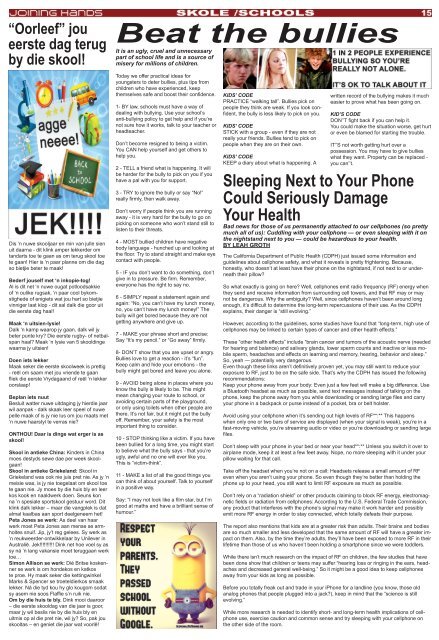You also want an ePaper? Increase the reach of your titles
YUMPU automatically turns print PDFs into web optimized ePapers that Google loves.
“Oorleef” jou<br />
eerste dag terug<br />
by die skool!<br />
Dis ‘n nuwe skooljaar en min van julle sien<br />
uit daarna - dit klink amper lekkerder om<br />
tandarts toe te gaan as om terug skool toe<br />
te gaan! Hier is ‘n paar planne om die dag<br />
so bietjie beter te maak!<br />
Bederf jouself met ‘n inkopie-tog!<br />
Al is dit net ‘n nuwe ougat potloodsakkie<br />
of ‘n oulike rugsak, ‘n paar cool bykomstighede<br />
of enigiets wat jou hart so bietjie<br />
vinniger laat klop - dit sal dalk die goor uit<br />
die eerste dag haal!<br />
Maak ‘n uitsien-lysie!<br />
Dalk ‘n kamp waarop jy gaan, dalk wil jy<br />
beter punte kry? Die eerste rugby- of netbalspan<br />
haal? Maak ‘n lysie van 5 skooldinge<br />
waarna jy uitsien!<br />
Doen iets lekker<br />
Maak seker die eerste skoolweek is prettig<br />
- reël om saam met jou vriende te gaan<br />
fliek die eerste Vrydagaand of reël ‘n lekker<br />
oorslaap!<br />
Beplan iets nuut<br />
Besluit watter nuwe uitdaging jy hierdie jaar<br />
wil aanpak - dalk skaak leer speel of nuwe<br />
pelle maak of is jy nie lus om jou maats met<br />
‘n nuwe haarstyl te verras nie?<br />
ONTHOU! Daar is dinge wat erger is as<br />
skool!<br />
Skool in antieke China: Kinders in China<br />
moes destyds sewe dae per week skoolgaan!<br />
Skool in antieke Griekeland: Skool in<br />
Griekeland was ook nie juis pret nie. As jy ’n<br />
meisie was, is jy nie toegelaat om skool toe<br />
te gaan nie. Jy moes by die huis bly en leer<br />
kos kook en naaldwerk doen. Seuns kon<br />
na ’n spesiale sportskool gestuur word. Dit<br />
klink dalk lekker – maar die vangplek is dat<br />
almal kaalbas aan sport deelgeneem het!<br />
Peta Jones se werk: As deel van haar<br />
werk moet Peta Jones aan mense se armholtes<br />
snuif. Jip, jy’t reg gelees. Sy werk as<br />
’n reukweerder-ontwikkelaar by Unilever in<br />
Australië. Jek!!!!!!!!!! Dink net hoe voel sy as<br />
sy ná ’n lang vakansie moet teruggaan werk<br />
toe…<br />
Simon Allison se werk: Dié Britse koskenner<br />
se werk is om hondekos en katkos<br />
te proe. Hy maak seker die kettingwinkel<br />
Marks & Spencer se troeteldierkos smaak<br />
lekker. Ná die tyd kou hy glo kougom sodat<br />
sy asem nie soos Flaffie s’n ruik nie.<br />
Om by die huis te bly. Dink mooi daaroor<br />
– die eerste skooldag van die jaar is goor,<br />
maar jy wil beslis nie by die huis bly en<br />
uitmis op al die pret nie, wil jy? So, pak jou<br />
skooltas – en geniet die jaar wat voorlê!<br />
Beat the bullies<br />
It is an ugly, cruel and unnecessary<br />
part of school life and is a source of<br />
misery for millions of children.<br />
Today we offer practical ideas for<br />
youngsters to deter bullies, plus tips from<br />
children who have experienced, keep<br />
themselves safe and boost their confidence.<br />
1- BY law, schools must have a way of<br />
dealing with bullying. Use your school’s<br />
anti-bullying policy to get help and if you’re<br />
not sure how it works, talk to your teacher or<br />
headteacher.<br />
Don’t become resigned to being a victim.<br />
You CAN help yourself and get others to<br />
help you.<br />
2 - TELL a friend what is happening. It will<br />
be harder for the bully to pick on you if you<br />
have a pal with you for support.<br />
3 - TRY to ignore the bully or say “No!”<br />
really firmly, then walk away.<br />
Don’t worry if people think you are running<br />
away - it is very hard for the bully to go on<br />
picking on someone who won’t stand still to<br />
listen to their threats.<br />
4 - MOST bullied children have negative<br />
body language - hunched up and looking at<br />
the floor. Try to stand straight and make eye<br />
contact with people.<br />
5 - IF you don’t want to do something, don’t<br />
give in to pressure. Be firm. Remember,<br />
everyone has the right to say no.<br />
6 - SIMPLY repeat a statement again and<br />
again: “No, you can’t have my lunch money,<br />
no, you can’t have my lunch money!” The<br />
bully will get bored because they are not<br />
getting anywhere and give up.<br />
7 - MAKE your phrase short and precise:<br />
Say “It’s my pencil.” or “Go away” firmly.<br />
8- DON’T show that you are upset or angry.<br />
Bullies love to get a reaction - it’s “fun”.<br />
Keep calm and hide your emotions - the<br />
bully might get bored and leave you alone.<br />
9 - AVOID being alone in places where you<br />
know the bully is likely to be. This might<br />
mean changing your route to school, or<br />
avoiding certain parts of the playground,<br />
or only using toilets when other people are<br />
there. It’s not fair, but it might put the bully<br />
off. Remember, your safety is the most<br />
important thing to consider.<br />
10 - STOP thinking like a victim. If you have<br />
been bullied for a long time, you might start<br />
to believe what the bully says - that you’re<br />
ugly, awful and no one will ever like you.<br />
This is “victim-think”.<br />
11 - MAKE a list of all the good things you<br />
can think of about yourself. Talk to yourself<br />
in a positive way.<br />
Say: “I may not look like a film star, but I’m<br />
good at maths and have a brilliant sense of<br />
humour.”<br />
KIDS’ CODE<br />
PRACTICE “walking tall”. Bullies pick on<br />
people they think are weak. If you look confident,<br />
the bully is less likely to pick on you.<br />
KIDS’ CODE<br />
STICK with a group - even if they are not<br />
really your friends. Bullies tend to pick on<br />
people when they are on their own.<br />
KIDS’ CODE<br />
KEEP a diary about what is happening. A<br />
written record of the bullying makes it much<br />
easier to prove what has been going on.<br />
KID’S CODE<br />
DON’’T fight back if you can help it.<br />
You could make the situation worse, get hurt<br />
or even be blamed for starting the trouble.<br />
IT’’S not worth getting hurt over a<br />
possession. You may have to give bullies<br />
what they want. Property can be replaced -<br />
you can’’t.<br />
Sleeping Next to Your Phone<br />
Could Seriously Damage<br />
Your Health<br />
Bad news for those of us permanently attached to our cellphones (so pretty<br />
much all of us): Cuddling with your cellphone — or even sleeping with it on<br />
the nightstand next to you — could be hazardous to your health.<br />
BY LEAH GROTH<br />
The California Department of Public Health (CDPH) just issued some information and<br />
guidelines about cellphone safety, and what it reveals is pretty frightening. Because,<br />
honestly, who doesn’t at least have their phone on the nightstand, if not next to or underneath<br />
their pillow?<br />
So what exactly is going on here? Well, cellphones emit radio frequency (RF) energy when<br />
they send and receive information from surrounding cell towers, and that RF may or may<br />
not be dangerous. Why the ambiguity? Well, since cellphones haven’t been around long<br />
enough, it’s difficult to determine the long-term repercussions of their use. As the CDPH<br />
explains, their danger is “still evolving.”<br />
However, according to the guidelines, some studies have found that “long-term, high use of<br />
cellphones may be linked to certain types of cancer and other health effects.”<br />
These “other health effects” include “brain cancer and tumors of the acoustic nerve (needed<br />
for hearing and balance) and salivary glands, lower sperm counts and inactive or less mobile<br />
sperm, headaches and effects on learning and memory, hearing, behavior and sleep.”<br />
So, yeah — potentially very dangerous.<br />
Even though these links aren’t definitively proven yet, you may still want to reduce your<br />
exposure to RF, just to be on the safe side. That’s why the CDPH has issued the following<br />
recommendations:<br />
Keep your phone away from your body: Even just a few feet will make a big difference. Use<br />
a Bluetooth headset as much as possible, send text messages instead of talking on the<br />
phone, keep the phone away from you while downloading or sending large files and carry<br />
your phone in a backpack or purse instead of a pocket, bra or belt holster.<br />
Avoid using your cellphone when it’s sending out high levels of RF**:** This happens<br />
when only one or two bars of service are displayed (when your signal is weak), you’re in a<br />
fast-moving vehicle, you’re streaming audio or video or you’re downloading or sending large<br />
files.<br />
Don’t sleep with your phone in your bed or near your head**:** Unless you switch it over to<br />
airplane mode, keep it at least a few feet away. Nope, no more sleeping with it under your<br />
pillow waiting for that call.<br />
Take off the headset when you’re not on a call: Headsets release a small amount of RF<br />
even when you aren’t using your phone. So even though they’re better than holding the<br />
phone up to your head, you still want to limit RF exposure as much as possible.<br />
Don’t rely on a “radiation shield” or other products claiming to block RF energy, electromagnetic<br />
fields or radiation from cellphones: According to the U.S. Federal Trade Commission,<br />
any product that interferes with the phone’s signal may make it work harder and possibly<br />
emit more RF energy in order to stay connected, which totally defeats their purpose.<br />
The report also mentions that kids are at a greater risk than adults. Their brains and bodies<br />
are so much smaller and less developed that the same amount of RF will have a greater impact<br />
on them. Also, by the time they’re adults, they’ll have been exposed to more RF in their<br />
lifetime than those of us who haven’t been holding a smartphone since we were toddlers.<br />
While there isn’t much research on the impact of RF on children, the few studies that have<br />
been done show that children or teens may suffer “hearing loss or ringing in the ears, headaches<br />
and decreased general well-being.” So it might be a good idea to keep cellphones<br />
away from your kids as long as possible.<br />
Before you totally freak out and trade in your iPhone for a landline (you know, those old<br />
analog phones that people plugged into a jack?), keep in mind that the “science is still<br />
evolving.”<br />
While more research is needed to identify short- and long-term health implications of cellphone<br />
use, exercise caution and common sense and try sleeping with your cellphone on<br />
the other side of the room.
















